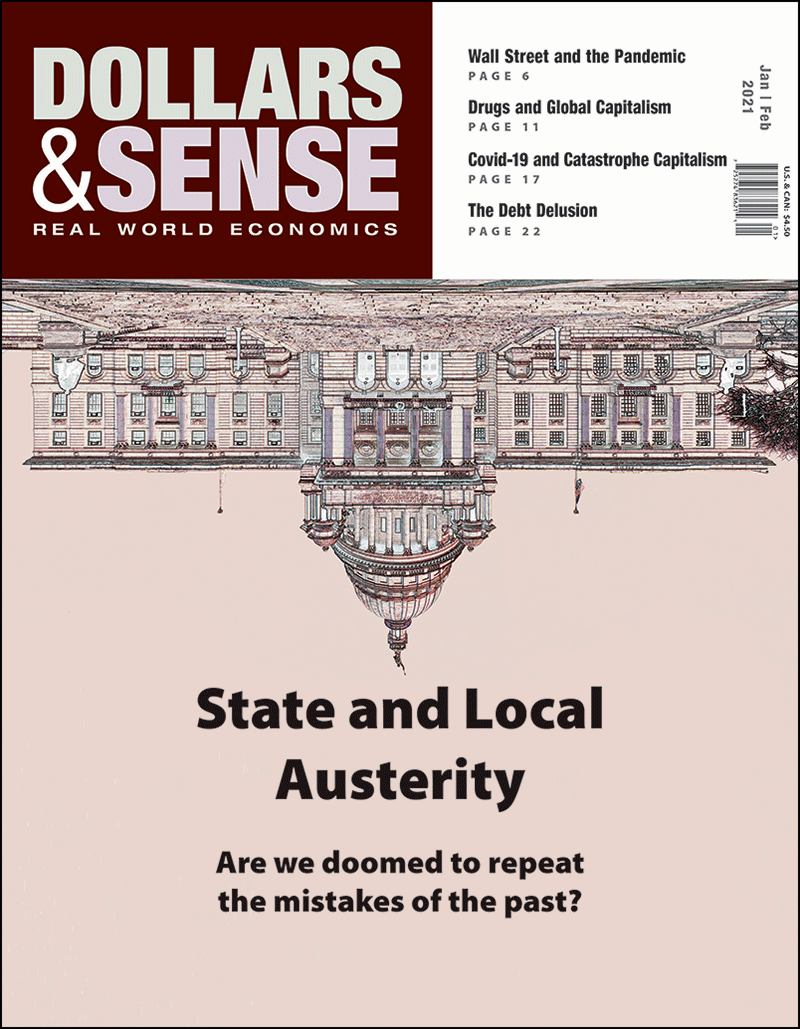Fighting Climate Change in Portlandia
Not only is failure not an option, those fighting to avert cataclysmic climate change have achieved important successes worthy of celebrating.

Our January/February 2021 issue is at the printers and will go out to e-subscribers very soon!
The cover story, "State and Local Austerity: Are we doomed to repeat the mistakes of the past?," by Amanda Page-Hoongrajok, is posted here, and John Miller's article on why the stock market is soaring while the economy is so bad for ordinary people is posted here.
Here is our p. 2 editorial:
The other good news was the appointment of Jared Bernstein to Biden’s CEA. Bernstein, currently at the Center on Budget and Policy Priorities, served as an economic advisor to Biden during the first two years of the Obama administration, and was a senior economist at the left-leaning Economic Policy Institute.
Having at least two economists at the White House whose research focuses on inequality and labor economics from a left perspective gives us some hope that the incoming president might resist calls for austerity in response to the current economic crisis.
In this issue’s cover story, economist Amanda Page-Hoongrajok addresses the dangers of imposing austerity at the state and local level. Hampered by balanced-budget rules—or at least by misguided norms that dictate that expenditures must match dwindling revenues—states and localities are making budget cuts that lead to damaging job losses and reductions in public services when they are needed most.
The federal government can play a role in preventing the downward spiral that state-and-local austerity creates, by relying on its ability to borrow at low rates to provide relief funds to struggling state and local governments. But as Page-Hoongrajok shows, there are alternatives if federal relief doesn’t come through. States and localities can raise taxes on the wealthy without worrying about dragging down demand, since wealthy households “spend smaller proportions of their disposable income than low-wealth households.” And cities and states can also buck the balanced-budget norm and borrow to meet today’s needs.
The idea that “there is no alternative” to austerity is a focus of this issue’s excerpt from the late John F. Weeks’s book The Debt Delusion. Weeks shows how political frameworks and ideology, not economic principles, have for decades made it seem as if we need to hand over decision-making—about exchange rates, monetary policy, and fiscal policy—to “experts,” but mostly to the private sector. But there is an alternative: public, democratic control.
The decades of ceding decision-making about the economy to private interests, along with the resulting massive growth of inequality, is what has created the situation that John Milleraddresses in his “Making Sense” piece in this issue—a soaring stock market in the midst of an economy struggling to recover from pandemic-induced collapse. How is this possible? The answer is partly about investors’ choices—with interest rates low, investment in bonds is less profitable and the stock market is more appealing. But this, too, is the result of policy choices: a government that lavished “unqualified and unstinting support” on financial markets instead of preserving jobs and providing income-support.
This issue also includes two features that take mind-bendingly broad perspectives on the global economy today. John Bellamy Foster and Itan Suwandi look at the role of global commodity chains and agribusiness in creating the conditions for the rise of dangerous diseases like Covid-19. (We have paired this with a primer on the “shock doctrine,” as applied to the current pandemic, by our own D&S collective member, economist Bryan Snyder.) And Sasha Breger Bush sketches out the vast scope of the global drug economy—enormous even before the operation of economies depended on finding treatments and vaccines for Covid-19.
Last but not least, Steven Pressman reviews Thomas Piketty’s Capital and Ideology, and Gertrude Schaffner Goldberg reviews William A. Darity Jr. and A. Kirsten Mullen’s important book on reparations for Black Americans, From Here to Equality.